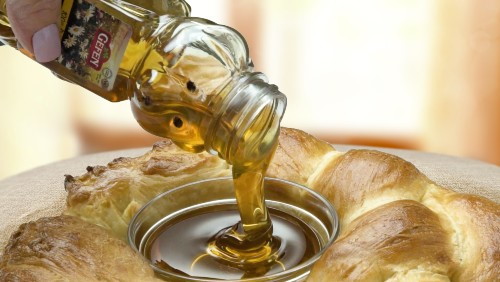From the time I was a young child, I’ve known that Rosh Hashanah was associated with apples and honey, symbolizing sweetness for the coming New Year. My mother would make her special apple cake and always served her carrot tzimmes sweetened with honey, a big favorite in our family.
In addition to the traditional wine and challah, other special dishes are used as ‘signs’ for a good omen. Instead of dipping chunks of challah in salt, as we usually do, we dip the challah in honey. We also dip apple slices in honey and ask G-d that we be renewed for a sweet year.
For the traditional festive meal on the first night of Rosh Hashanah, there is a special ceremony for the blessing and eating of symbolic foods. These are called simanim meelta (significant omens) and are based on a Talmudic teaching. We say a short prayer about the symbolism of each of the following foods before we eat them. The special foods and what they symbolize are:

Apple dipped in honey (that we should have a good and sweet year – honey in general)
Fenugreek or carrots (that we should increase our merits)
Leeks or cabbage (that our enemies be decimated)
Beets (that our adversaries be removed)
Dates (that our enemies be consumed)
Gourd (that the decree of our sentence should be torn asunder, and our merits be proclaimed to G-d)
Pomegranate (that our merits increase, as the seeds of the pomegranate)
Fish (that we should be fruitful and multiply)
Head of a fish or a sheep’s head (that we should be as a head and not a tail)
We also try to use foods whose names lend toward signs and omens. Carrots (gezer in Hebrew) are a popular item since in Hebrew, gezer, is the same word for carrot and a decree. So we request that G-d will withhold any evil gezer (decree).
My friend Helene Medjuck of Toronto likes to serve a whole smoked whitefish including the head and uses an olive for the eye. Her children and husband are not too thrilled with her food garnishing techniques, but Helene isn’t the least bit concerned. Her son Alexander was once at someone’s home where they served a sheep’s head and he said it was actually delicious!
Some people take a stalk of celery and some raisins and prior to eating them, they request of G-d to help them get a “raise in their salary.”
Just as we try to eat special dishes on Rosh Hashanah, we refrain from other foods. Nuts are avoided because they have a tendency to lodge in the throat, thus making proper prayer difficult and also because they have the same numerical equivalent (in Hebrew) as sin, which we are trying to avoid. Some people won’t use vinegar or mustard to avoid sour or sharp flavors.
To make Rosh Hashanah an even sweeter holiday, my friend Jayne Cohen, author “Jewish Holiday Cooking: A Food Lover’s Treasury of Classics and Improvisations” (Wiley) and her daughter Alex always bring a fragrant honey back from every trip. This has become their own special Rosh Hashanah tradition.
Jayne Cohen writes in her book, “There is a world of difference between ordinary supermarket honey and an artisinal product. If you absolutely can’t track down a special honey for Rosh Hashanah, make your plain honey more distinctive. Warm 1 cup honey in a small saucepan. Stir in sprigs of fresh thyme, rosemary, or mint; fresh sage leaves; or 2 teaspoons dried lavender. Cover and let steep for several hours. Then, heating the honey first if necessary, strain it. Or beat into the honey a few drops of a flavoring extract such as strawberry, lemon, or even almond, or a spoonful of very reduced aromatic fruit juice (apple-raspberry, for example).”

Cohen further explains, “Rosh Hashanah celebrates the pun in the prayers recited at the evening meal over many of the symbolic foods. On this solemn holiday, blessings in Hebrew and the many languages of the Diaspora reflect a rather humorous tickling of words. Who cannot see the twinkling in the eyes of the sages as we, in a modern English adaptation, eat beets to “beat back our foes” and dates to “date this year as one of happiness and peace?” Leek in Hebrew is kartee, which sounds like the word yihartu, to cut off. So Sephardim eat leek patties to “cut off their enemies.”
Here are some special ideas using the special symbolic foods to ensure you’ll have an especially sweet and healthy New Year! And here are 5 creative ways to display and serve your simanim.
————————————————————————————————-
Reprinted with permission from the OU







Reviews